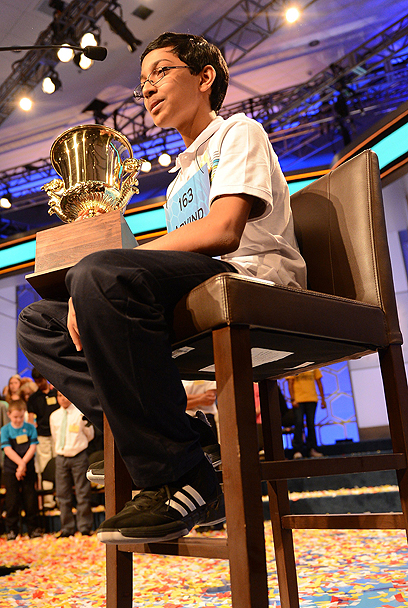
13-year-old spells 'knaidel,' wins Spelling Bee
Indian-American kid from New York thwarted for two years by German-rooted terms until Yiddish word for dumpling gains him title
Arvind Mahankali, a 13-year-old eighth-grader from Bayside Hills, New York, won the Scripps National Spelling Bee on Thursday, correctly spelling the word "knaidel," CNN reported.
"It means that I am retiring on a good note," said Mahankali, who attends Nathaniel Hawthorne Middle School 74 and was in his last year of eligibility. "I shall spend the summer, maybe the entire day, studying physics."
Related stories:
- Yiddish: Link between past, present
- Poland returns Yiddish writer's works
- Yiddish thrives around the world
Mahankali, who wants to become a physicist, had finished third in the two previous national bees, being eliminated after misspelling words with German roots.
Arvind Mahankali wins contest (Video: Reuters)
"I thought that the German curse had turned into a German blessing," he told CNN, when asked what he thought when he heard the final word, a German-derived Yiddish word for a type of dumpling.
Pranav Sivakumar, a 13-year-old from Tower Lakes, Illinois, finished second. He missed on "cyanophycean" before Mahankali nailed "tokonoma" and "knaidel" for the victory.
The annual contest offers the winner a healthy dose of classroom cred, $32,500 in cash and savings bonds, a trophy and a library of reference materials.

Arvind Mahankali with his trophy (Photo: MCT)
Eleven million schoolchildren participated in preliminaries leading up to the national contest this week. Of those, 281 children made the trip to Oxon Hill, Maryland, just outside Washington, for the national bee. Eleven spellers made it through to the finals.
Among them were 63 children who had been to at least one national bee before, and had to prepare for some changes in the rules for this year's events.
For the first time, participants had to demonstrate proficiency in vocabulary in addition to spelling.
Organizers also added an additional computer test for the semifinals, imposed time limits on computer-based spelling and vocabulary tests and added a rule that resulted in automatic elimination for any participant who misspelled a word on stage in the second or third rounds.
- Receive Ynetnews updates directly to your desktop











